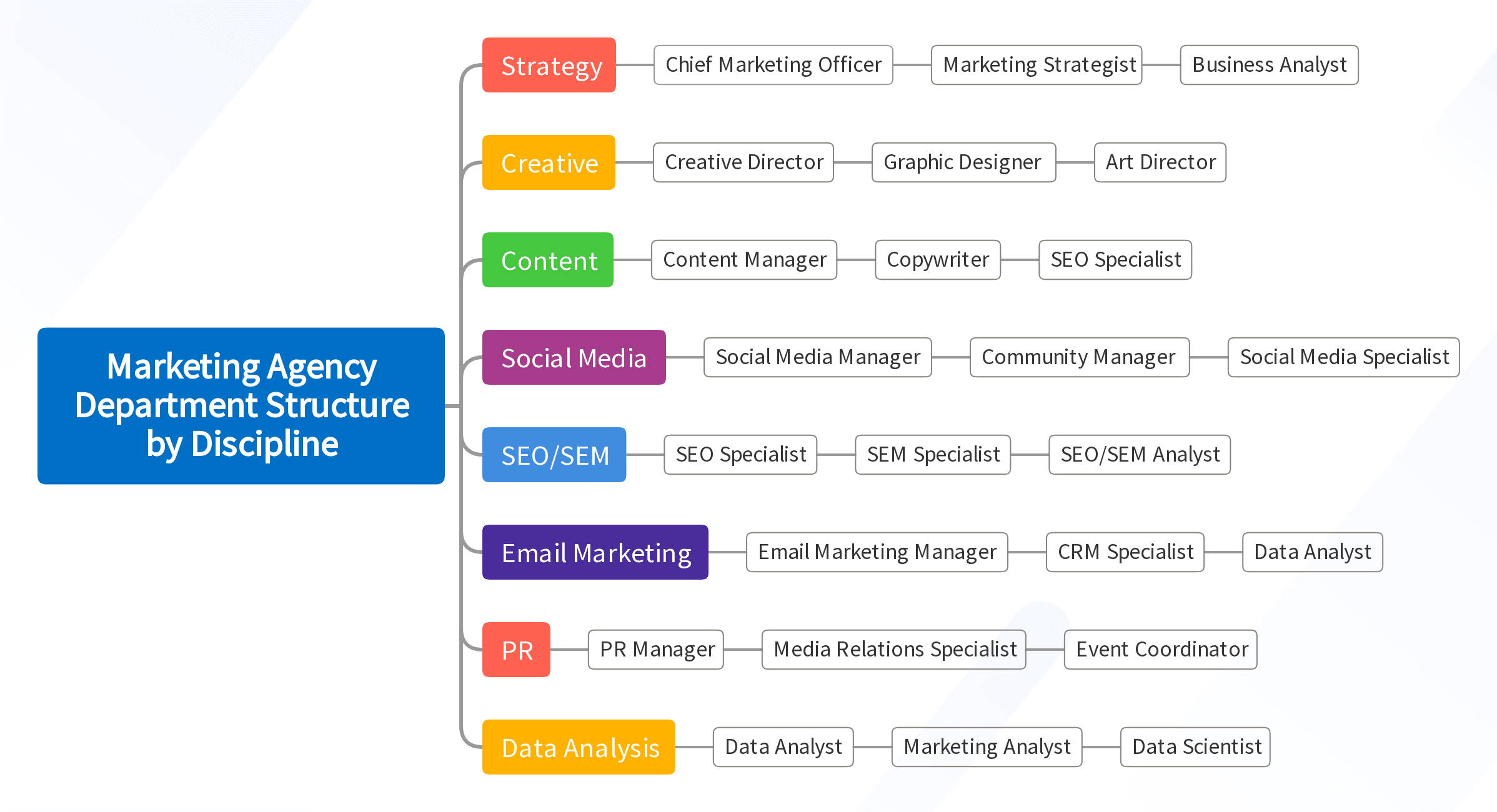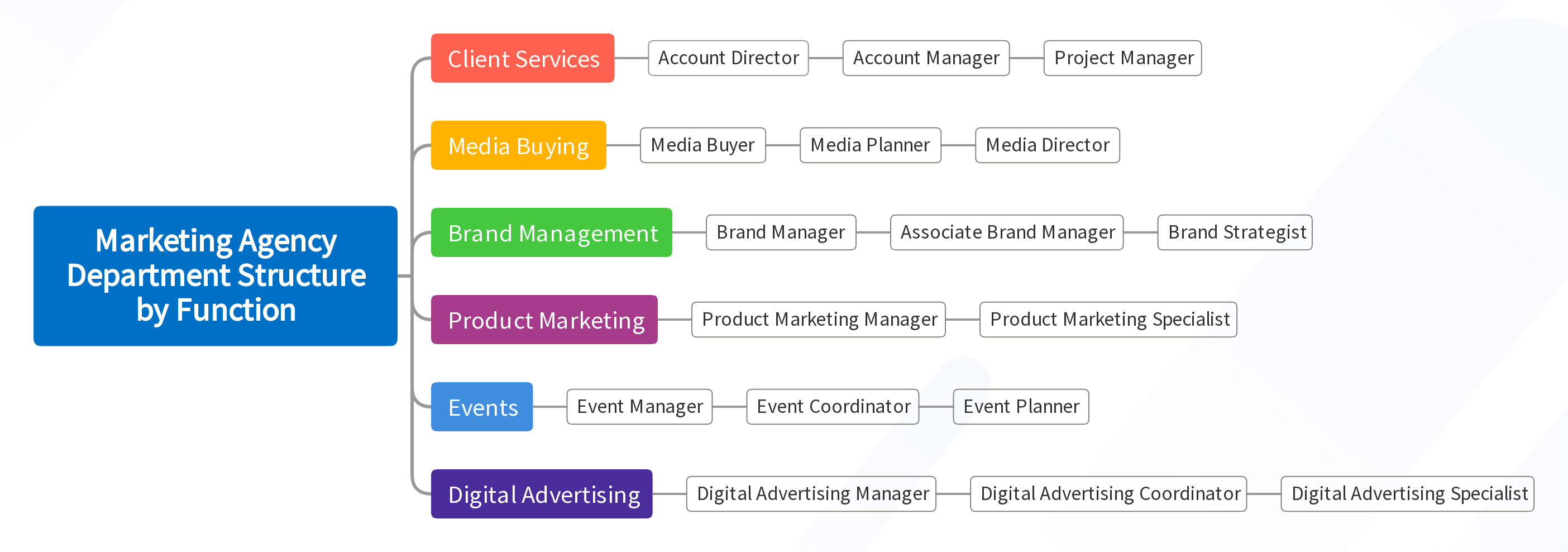

Building a successful marketing agency team is no small feat. It needs strategic planning and careful coordination.
In today's fast-paced business world, these teams are crucial. They foster growth and propel businesses forward. I've been running my own successful marketing agency for years so I speak from experience.
But first, let's talk about the Marketing Agency department structures you have to choose from.
Best for Growth Marketers
Best for Paid Ads & CMO's
Table of Contents
Structuring Marketing Agency Department
There are two main types of department structures based on company size and resources.
- Marketing Agency department structure by discipline
- Org Type: Traditional corporate departments
- Best For: Midsize/Enterprise companies
- Marketing Agency department structure by function
- Org Type: Employees are grouped by activities and objectives
- Best For: Small to Medium Sized Business (SMB)
Let’s go in-depth to each one of them.
1. Marketing Agency Department Structure by Discipline


Discipline-based structure involves building teams centered around various marketing disciplines. For example, SEO, Content, Market Research, and Product Strategy could each form separate teams within a department.
| Discipline | Key Skills | Potential Roles |
|---|---|---|
| Strategy | Market Research, Business Analysis, Problem Solving, Critical Thinking, Communication | Chief Marketing Officer, Marketing Strategist, Business Analyst |
| Creative | Graphic Design, Ideation, Art Direction, Attention to Detail, Time Management | Creative Director, Graphic Designer, Art Director |
| Content | Content Creation, SEO, Copywriting, Storytelling, Editing | Content Manager, Copywriter, SEO Specialist |
| Social Media | Community Management, Content Planning, Analytics, Social Media Marketing, Customer Service | Social Media Manager, Community Manager, Social Media Specialist |
| SEO/SEM | SEO, SEM, Keyword Research, Google Analytics, Data Analysis | SEO Specialist, SEM Specialist, SEO/SEM Analyst |
| Email Marketing | Email Marketing, Copywriting, CRM, Data Analysis, A/B Testing | Email Marketing Manager, CRM Specialist, Data Analyst |
| PR | Media Relations, Press Release Writing, Crisis Management, Networking, Event Planning | PR Manager, Media Relations Specialist, Event Coordinator |
| Data Analysis | Data Mining, Statistical Analysis, Predictive Modeling, Data Visualization, Reporting | Data Analyst, Marketing Analyst, Data Scientist |
2. Marketing Agency Department Structure by Function


Another approach is structuring by function, where teams are formed based on the different functions they perform. For example, promotion, launches, and relationship management could all be separate teams.
| Function | Key Skills | Potential Roles |
|---|---|---|
| Client Services | Relationship Building, Project Management, Strategic Thinking, Communication, Conflict Resolution | Account Director, Account Manager, Project Manager |
| Media Buying | Negotiation, Media Planning, Analytics, Budgeting, Attention to Detail | Media Buyer, Media Planner, Media Director |
| Brand Management | Brand Strategy, Market Research, Creative Thinking, Communication, Customer Understanding | Brand Manager, Associate Brand Manager, Brand Strategist |
| Product Marketing | Product Knowledge, Market Research, Competitive Analysis, Cross-Functional Collaboration, Storytelling | Product Marketing Manager, Product Marketing Specialist |
| Events | Event Planning, Organizational Skills, Attention to Detail, Creativity, Crisis Management | Event Manager, Event Coordinator, Event Planner |
| Digital Advertising | Advertising, Data Analysis, Creativity, Digital Media, Attention to Detail | Digital Advertising Manager, Digital Advertising Coordinator, Digital Advertising Specialist |
Marketing Agency Team Size versus Business Scale
To achieve successful marketing outcomes, you need to align the team size with your business's scale – a strategic approach that helps optimize resources and drive targeted growth.
| Business Scale | Ideal Department Size | Explanation |
|---|---|---|
| Start-up | 2-3 | Minimal resources, focus on core strategies |
| Small-Medium Business | 4-8 | Growth stage requires diverse expertise |
| Large Enterprise | 10+ | Multiple campaigns, global outreach, varied audience |
Factors to Consider When Deciding On a Marketing Agency Department Structure
- Marketing Specialties: Understand what your business needs in terms of marketing. This could be SEO, content marketing, social media, public relations, or a mix of these. Your agency structure should reflect these specializations.
- Team Expertise: The skills and experience of your team members matter significantly. Decide on a structure that best leverages their strengths and promotes collaboration.
- Business Objectives: Your agency's structure should align with your business goals. Whether it's to increase visibility, drive sales, or improve customer engagement, make sure your structure supports these objectives.
- Clientele Requirements: Consider the needs and expectations of your clients. A structure that can deliver on these expectations while providing excellent customer service will prove beneficial.
- Agency Size: The size of your agency matters. A smaller agency might benefit from a more agile, flat structure, while a larger agency might need a more hierarchical organization to manage different departments effectively.
Explore other marketing departments:
So, there you have it, a detailed overview of a Marketing Agency team structure. From the essence of the team and key roles, to structuring and optimizing; every aspect tailored to achieve success on your business blueprint.




















